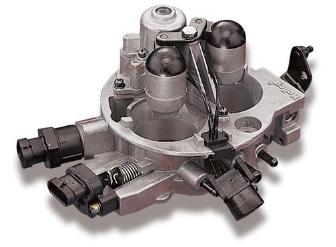
(Throttle Body Injection System – Image used for reference only. Image is not from a 3.8L)
By James Marcy
Note: The 1984-1987 Ford Cougar used Central Fuel Injection (CFI). This motor retained the traditional circular air cleaner but swapped out the carburetor for a throttle-body type injection system (1-bbl with 2 high-flow injectors). Output was now rated at 120 hp. The engine used Ford’s EEC-IV system, greatly increasing the ability to troubleshoot problems. Some early cars (1984-85) had issues with faulty EEC modules, though, resulting in poor performance and reliability until properly diagnosed. Generally this CFI setup was very responsive and did its job well. The heads were updated from the carb style, with revised exhaust ports. By far, this was the most popular engine to be found in 1984-87 Cougars. Porting and polishing should make a huge difference, especially with low-end torque. A custom-ground camshaft with more radical lobes can definitely wake up the motor, too. There’s also a distinct possibility that parts from newer 3.8 engines may work, although that remains unknown.
A 3.8 Fuel Injection (FI) onto a 2.8 is so simple and easy, you’ll wonder why Ford Motor Company didn’t do it themselves. What is required is a complete FI engine harness and computer (ECM) from any rear wheel drive (RWD) Ford car with a 3.8, such as a Mustang, LTD II, or Cougar. A 3.8 from a Taurus is the Wrong FI! First you want to start out by CAREFULLY removing the original Ranger engine and computer wiring harness, original ECM, and entire vacuum harness and solenoids. This will leave the engine compartment free of all original computer equipment, as if you were doing a V8 conversion. The sensors from the 3.8 should be used, because the 2.8 sensors may not plug into the 3.8 harness.
These are:
Coolant temp sensor (not for the gauge)
Air temperature sensor (in air cleaner)
Throttle position sensor will already be mounted on the 3.8 throttle body
And the 6-wire plug for the module on the distributor will plug into the 2.8 distributor.
All the computer needs to see is a 6-cylinder pulse, it doesn’t care what size the engine is. Remove the carb, and bolt the throttle body in its place, its that easy. Remove the fuel pump and ALL lines all the way back to the tank. Make a block off plate for hole left by the pump. The engine harness should be routed as close to original as possible, keep it away from spark plug wires if possible. Mount the ECM in the same location. You should get the steel lines from the 3.8 and a 2.9 Ranger FI tank and ALL lines, wiring and pumps, these need to be installed into your Bronco II or Ranger, it’s really not that complicated. How you mate the 3.8 lines to the 2.9 lines is up to you, there are several variations, so I won’t go into that detail, jut remember, the fuel pres. is at 44psi, so make it like factory! Also, pre-test the in-tank fuel pump, they quit and it’s very important. As far as powers and grounds, you will need a wiring diagram from the 3.8 car, and your Ranger, the original harness still in your vehicle will supply the required powers and ground. This is not a conversion for the weekend do it yourselfer, The ECM can go up in smoke if done wrong. I have done several, and it really wakes up a 2.8, your original carb was rated at 280 cfm, the throttle body is more like 350 cfm. Bigger (2 1/4″) exhaust will really help.
Feedback:
By EPerez 02/21/02:
Just for general knowledge…
I recently did the conversion on my 1984 Ranger. At first I had a variety of problems. These included rich running at idle, leaning at higher rpm’s, higher than normal idle speed, and no one that had any information…. Plus I was getting really #$% gas mileage…
As of two weeks ago, I believe I have fixed all of the problems.. The rich running at idle was cured through the use of a fuel pressure regulator, the leaning turned out to be a faulty injector, and the high idle speed was a result of the rich running…
Since I have solved these problems, I have kept a close account of my fuel consumption, and have been consistently getting just over 21 mpg… This is with the mid performance cam, an MSD ignition unit, headers, and a Holley performance TFI unit…
The truck has been running very well, but I wish that someone who could have saved me all of the trouble I went through…. It only costly me (including the fuel pump, pressure regulator, and EFI stuff) around $400, but there was a considerable amount of time spent trouble shooting the problems I had…
On the plus side, I can say that when I do another conversion it will only take me the time to install the components, and alter some wiring. Two solid days, for the knowledgeable, two weekends for the learning..
I hope this helps somebody…
